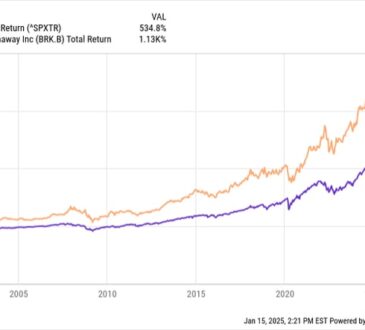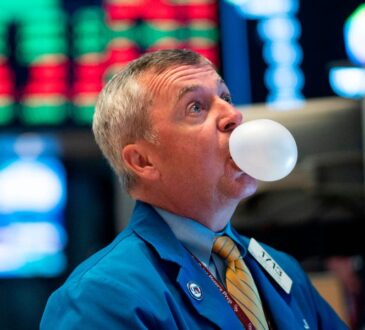
- The Buffett Indicator is indicating US stocks might be overvalued.
- The indicator was coined by Warren Buffett and measures the total US market cap to GDP.
- “If the ratio approaches 200% — as it did in 1999 and a part of 2000 — you are playing with fire,” Buffett said in a 2001 Fortune article.
Warren Buffett’s favorite stock market valuation indicator just hit a record high, signaling that stocks might be highly overvalued.
The Buffett Indicator, which measures the total market cap of US stocks relative to US GDP, hit an all-time peak of 200% on Monday, surpassing the record high of 197% reached in November 2021.
In other words, the US stock market’s total market cap of about $55 trillion, as measured by the Wilshire 5000 index, is about double the size of annualized US GDP, which is at about $27 trillion.
The stock market experienced a painful year-long bear market shortly after the Buffett Indicator peaked in November 2021.
In a 2001 Fortune article, Buffett called the indicator “probably the best single measure of where valuations stand at any given moment.”
When the indicator reached an “unprecedented level” during the 2000 dot-com bubble of about 190%, “that should have been a very strong warning signal,” Buffett said in the article.
“For me, the message of that chart is this: If the percentage relationship falls to the 70% to 80% area, buying stocks is likely to work very well for you. If the ratio approaches 200% — as it did in 1999 and a part of 2000 — you are playing with fire,” Buffett said.
Fast forward to 2024, and it appears investors are playing with fire.
In a note on Thursday, B. Riley strategist Paul Dietrich pointed to the unprecedented reading in the Buffett Indicator as a reason why investors should be cautious on stocks.
In a conversation with Business Insider this week, fund manager Chris Bloomstran of Semper Augustus said that while the Buffett Indicator is somewhat of a flawed tool, it is worth paying attention to as an investor.
“I think there is utility to it, and that it’s most likely a mean reverting series, and there is validity to that,” Bloomstran said.
However, investors need to apply an “upward trend channel” to the indicator to account for the changes in today’s economy compared to the economy in previous eras.
The US economy is structurally different now than even a few decades ago, with materially higher corporate profit margins, more asset-light businesses via the technology sector, a more globalized economy, and significantly different levels of interest rates and inflation.
“So if profits are higher, profit margins are higher, naturally the price you pay for profits, the P/E multiple, if you hold P/Es constant, you’re applying it against the higher profit margins, so that’s going to drive up your market cap relative to GDP,” Bloomstran explained.
“You can’t say, compare today’s market to 2000 compared to 1929 because these metrics were so different at these different intervals,” Bloomstran added.
But despite the Buffett Indicator’s flaws, it is flashing a big warning signal for stock market investors at current levels, according to Bloomstran.
“I think it’s screaming the cap-weighted stock market, the Wilshire 5000 [and] the S&P 500, is incredibly dangerous today. I think if you own the S&P 500 in a cap-weighted setting, you’re in for trouble,” Bloomstran said. “It’s absolutely flashing a secular peak.”





